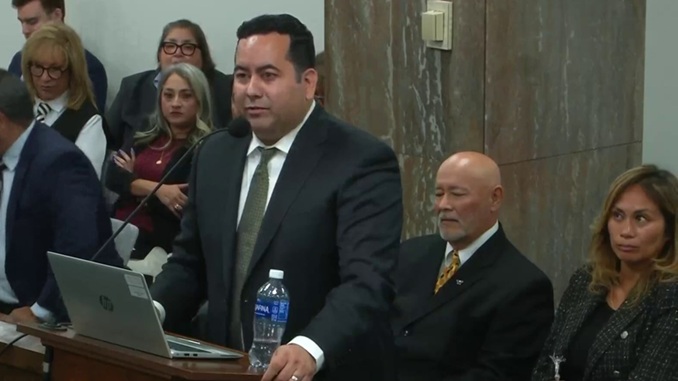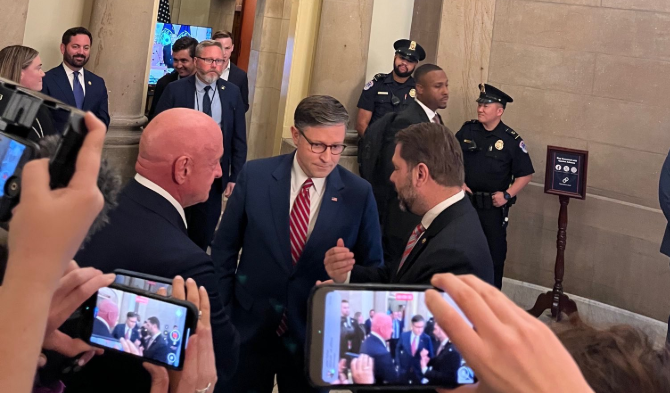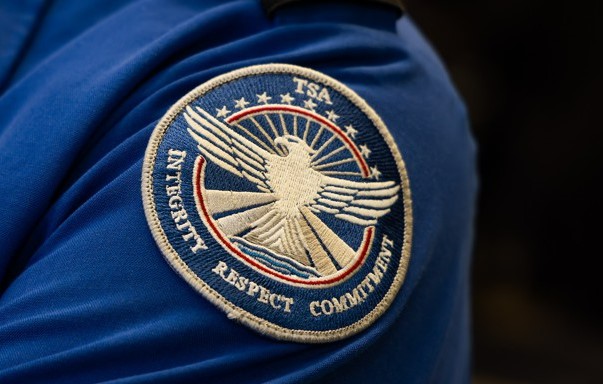
by Matthew Holloway | Oct 10, 2025 | News
By Matthew Holloway |
The ongoing disagreement between the City of Scottsdale and Axon Enterprise, Inc. has taken on a new dimension after the city issued a clarification of its position on last week. Regardless of whether the controversial “Axon Bill,” SB 1543, remains in effect, the city stated that Scottsdale City Code Section 2-5 requires a referendum to be placed on the ballot at the next general election, scheduled for Nov. 3, 2026.
In a statement issued October 3rd, the city stated that the timetable for a referendum could be shortened, noting, “The city could, if directed by the City Council, place that referendum question on a city election ballot before Nov. 3, 2026, by calling a Spring 2026 Special Election or placing the item on the Aug. 4, 2026, primary election ballot.”
Responding to the enactment of SB 1543 in April, the City Council voted to authorize filing a notice of claim/notice of unconstitutionality in a special meeting on September 12th. The claim filed on September 15th serves as formal notice to the State of Arizona that potential legal action from the city may follow. As reported by AZ Free News at the time, SB 1543 strips residents in cities of certain sizes, including Scottsdale, of their ability to challenge zoning decisions through ballot initiatives. The law applies retroactively and nullified a referendum effort by nearly 27,000 Scottsdale residents who had petitioned to challenge a city council-approved expansion of Axon’s Scottsdale headquarters, which included almost 2,000 multifamily residential units, over 400 hotel rooms, and approximately 47,000 square feet of retail and restaurant space.
City leaders pleaded with Governor Katie Hobbs to veto the bill, citing local concerns over increased traffic and infrastructure strain. They wrote in their plea, “These are not abstract issues—they impact the daily lives of our residents.”
Scottsdale Mayor Lisa Borowsky and the City Council warned that SB 1543 “undermines the principles of local control that are foundational to Scottsdale’s governance,” adding that it “sets a dangerous precedent.”
Borowsky told KTAR 92.3 host Mike Broomhead last week that, before “going to the state legislature,” Axon was negotiating with the city, and the 2000-apartment plan could have been reduced to 750. She added, “Let me be clear, I’m opposed to that high density of housing units,” referring to the initial 2,000 unit plan, but added there are three members of the council who are “vehemently” opposed to negotiation.
Public Affairs Supervisor Holly Peralta wrote, “The City Council’s vote did not authorize litigation, but that step could be taken by a separate Council action in the future.” She further added that a political action committee filed suit against the state and the city regarding Senate Bill 1543.
The lawsuit filed by Taxpayers Against Awful Apartment Zoning Exemptions, or TAAAZE, claims that SB1543 violates both the “special laws” ban in the Arizona Constitution, as well as the right of referendum enshrined there.
Alexis Danneman, a Perkins Coie, LLP, partner and lead counsel for TAAAZE, said in a statement. “This lawsuit is about two of our State Constitution’s most important principles. First, it’s about the right of Arizona voters to hold referenda and vote directly on legislation passed by their city councils but with which they disagree. Second, it’s about the Constitution’s ban on so-called ‘special laws,’ like the Axon Bill, that confer special privileges and benefits on a specific company or group. The Axon bill passed by the Legislature and signed by the governor is the very definition of special interest legislation and it is illegal in the state of Arizona.”
As a separate matter, the city is “evaluating that lawsuit,” according to Peralta.
Matthew Holloway is a senior reporter for AZ Free News. Follow him on X for his latest stories, or email tips to Matthew@azfreenews.com.

by AZ Free Enterprise Club | Oct 9, 2025 | Opinion
By the Arizona Free Enterprise Club |
How long must taxpayers be forced to throw money at a failed plan before something is done about it? For the Maricopa Association of Governments’ (MAG) regional transportation plan—which for two decades spent billions on light-rail and other wasteful “active transportation” projects and has primed the pump for another twenty years of boondoggle spending—The Club hopes the answer is not much longer.
Since 2004, local governments through MAG have siphoned more and more funding from a transportation tax to build white elephant transit projects throughout Maricopa County. Yet MAG won’t budge from its broken plan despite collapsed ridership, worsened congestion, and ballooning costs – for projects that don’t match how people actually travel.
The good news is that with the next statutory transportation audit coming due July 2026, lawmakers on the Joint Legislative Audit Committee (JLAC) will have an opportunity to weigh in on the MAG plan and provide recommendations for change.
State law requires that these five-year audits evaluate several elements of the MAG plan, including transit service, costs, ridership, congestion, and mobility. While previous audits flagged some deficiencies, they lacked any concrete performance metrics, and on a few occasions were prepared by a firm tied to MAG (a conflict of interest). So, to further bolster the JLAC process, the Arizona Free Enterprise Club brought in a nationally recognized transportation expert to conduct an audit of the plan. The result: MAG’s plan is failing and needs a major overhaul.
>>> CONTINUE READING >>>

by Staff Reporter | Oct 9, 2025 | Education, News
By Staff Reporter |
The superintendent of Tolleson Union High School District (TUHSD), Jeremy Calles, declined to show up to a legislative hearing to audit his district.
Instead, Calles had a notice of defamation claim served to the committee ahead of their hearing. State Representative Matt Gress, House Education Committee chairman and Joint Legislative Audit Committee vice chairman, explained that Calles filed the $150,000 defamation claim because lawmakers were holding the hearing.
Gress also said Calles wanted to charge him up to $28,000 for “basic” public records pertaining to the district’s finances. Gress requested those records in August following a separate committee hearing the previous month.
“This is a very unusual situation,” said Gress. “I’ve not seen a school district or any political subdivision of the state for that matter, be so antagonistic to the legislature’s constitutional authority and responsibility to investigate allegations of wrongdoing.”
Lawmakers held a joint audit committee hearing on Tuesday to discuss TUHSD finances under Calles.
TUHSD came under legislative scrutiny following a $25 million leaseback agreement to rescue the Isaac School District (ISD) at the start of this year — another district with allegations of financial mismanagement. Calles disclosed in the July hearing that initial conversations on the ISD deal began with the other role he holds as a consultant. Calles is the highest paid superintendent in the state.
Gress flagged the deal as potentially unlawful and challenged Attorney General Kris Mayes’ approval of the deal.
“This agreement raises glaring legal and financial red flags,” said Gress. “The Isaac School District has a long history of financial mismanagement, and now it’s relying on a last-minute bailout that may not even be legal. The Attorney General owes the public clear answers about how this deal was approved and whether it complies with state law.”
ISD was placed into receivership in January. Preliminary investigations into the district’s finances found it overspent nearly $30 million — mainly federal relief dollars during the COVID-19 pandemic — and falsified financial records.
Over the summer, Governor Katie Hobbs vetoed legislation inspired by ISD that would oust the school board of any district placed in receivership.
“[T]he financial mismanagement of the Isaac School District is unacceptable, and governing board leadership must take accountability and resign,” said Hobbs. “This bill appears to seek broad retribution rather than providing targeted methods to address problems. Mandating the upheaval of an entire elected school board is blatant legislative overreach that would create disruption and confusion for school districts during a time of crisis.”
Last November TUHSD spent nearly $77,000 on “luxury vacations” for its board members and administrators over the course of two days for just 30 people.
The bipartisan committee voted unanimously, 9-0, to audit TUHSD following testimony.
Felipe Mandurraga, who was a principal at Tolleson Union High School for eight years until he resigned following this spring semester, testified that Calles abused funding. One of Mandurraga’s allegations was that Calles handed out $20,000 vouchers to teachers without rules on their expenditure.
Apart from finances, Mandurraga also alleged TUHSD officials allowed a teacher in a relationship with a student to resign with full benefits without launching an investigation, filing a report with police, or reporting the incident to the Arizona State Board of Education (ASBE). Mandurraga further alleged the teacher in question was hired two weeks later by another district and has no pending complaints according to ASBE.
Mandurraga also alleged that Calles denied the removal of a student suspected of possessing a gun on campus; several months later, that same student was involved in a Phoenix shooting.
Calles denied knowledge of the alleged incident to members of the media.
The committee also heard testimony from the Citizens for Schools Accountability.
Auditor General Lindsay Perry said the audit would take until January 2027 to complete.
Last December, TUHSD placed Calles on paid leave amid tensions between himself and several board members. Months before, Calles had filed a formal sexual harassment complaint against then-Governing Board President and current State Representative Elda Luna-Najera.
An independent investigation by TUHSD found that Calles and Luna-Najera were in a consensual, sexual relationship. Calles filed a complaint of retaliation for his placement on paid leave.
In January, TUHSD paid Calles $450,000 to settle his complaints of sexual harassment and retaliation. TUHSD Governing Board President Leezah Sun read the statement announcing the settlement. Sun resigned from the state legislature last year to avoid expulsion after the House Ethics Committee found she violated ethics rules.
Prior to becoming TUHSD superintendent in 2023, Calles served as the district’s chief financial officer for six years.
AZ Free News is your #1 source for Arizona news and politics. You can send us news tips using this link.

by Matthew Holloway | Oct 9, 2025 | News
By Matthew Holloway |
On Wednesday, House Speaker Mike Johnson (R-LA) clashed with Arizona Democratic Sens. Mark Kelly and Ruben Gallego in a heated Capitol hallway exchange over the ongoing government shutdown and the delayed swearing-in of Rep.-elect Adelita Grijalva (D-AZ-07).
While shutdown disputes are routine, the controversy over Grijalva’s seating is not. The late Rep. Raúl Grijalva’s daughter’s election victory won’t be certified until October 14th, but this seemed lost on Sens. Kelly and Gallego.
Speaker Johnson addressed the non-issue briefly after the Senators joined Grijalva in accusing him of making “excuses.”
Johnson told them, “We’re happy that she got elected. She’s filling her father’s seat, that’s fantastic.” But he clarified, “We have a long tradition here and a process of how we administer the oath to a member. …We’re going to do that as soon as we get back to work, but we need the lights turned back on, so we encourage both of you to go open the government.”
Rep.-elect Grijalva has been posting videos to social media accusing Johnson of making “excuses” for not seating her. She has claimed that “Southern Arizona still does not have a voice in Washington” and asked her soon-to-be constituents to pressure the Speaker into opening the House just to swear her in. This comes despite a release from Arizona Secretary of State and fellow Democrat Adrian Fontes on September 23rd, which reiterated that County Canvases were due October 9th and Statewide canvass is scheduled for October 14th.
Grijalva, Kelly, and Gallego have alleged that Johnson is refusing to swear her in to prevent a vote on releasing files related to the Jeffrey Epstein case with Gallego claiming, “You guys just don’t want her to be on the Epstein discharge petition. …This is an excuse so that she doesn’t sign onto that,” according to the Washington Examiner.
Johnson was direct in rebutting him, saying, “That’s totally absurd. You guys are experts at red herrings and distractions,” using the same phrase he did to describe Democrats’ Medicaid-related talking points. “There’s nothing to do with Epstein,” he added.
Turning to reporters, the Speaker dismissed the Democrats’ accusations as “a publicity stunt” and added that he is not “blocking her.”
Referring to the matter again as “distraction” and a “red herring” speaking to News Nation on Wednesday, Johnson was dismissive and said, “This has absolutely nothing to do about Epstein, this is a scheduling matter. As soon as the Democrats vote to reopen the government, we’ll get back to the regular order and session of Congress and that’ll be, I’m sure, among our first orders of business is to administer the oath to the newly elected representative.”
Matthew Holloway is a senior reporter for AZ Free News. Follow him on X for his latest stories, or email tips to Matthew@azfreenews.com.

by Ethan Faverino | Oct 9, 2025 | News
By Ethan Faverino |
Just one week after discovering the TSA’s Quiet Skies Program was targeting him, Congressman Abe Hamadeh (R-AZ-08) raised urgent questions about the extent of the Biden administration’s violations of Americans’ civil rights.
The latest disclosures, brought to light by FBI Director Kash Patel, expose that former Special Counsel Jack Smith and his “Arctic Frost” team, tasked with investigating January 6, allegedly tracked the private communications and phone calls of multiple Republican lawmakers.
According to Fox News Digital, the targeted individuals included Republican Senators Lindsey Graham (SC), Marsha Blackburn (TN), Ron Johnson (WI), Josh Hawley (MO), Cynthia Lummis (WY), Bill Hagerty (TN), Dan Sullivan (AK), Tommy Tuberville (AL), and Republican Representative Mike Kelly (PA).
“I am disappointed, but not at all surprised, to learn more about how the Joe Biden administration weaponized the federal government to violate citizens’ sacred civil rights,” stated Hamadeh. “This corrupt cabal went to great lengths to keep sunlight from illuminating the truth about the 2020 election of Biden, so it is no surprise at all that the calls they were tracking were likely in reference to the vote to certify the 2020 election.”
The Quiet Skies program, administered by the Transportation Security Administration (TSA), is a domestic surveillance initiative designed to monitor travelers deemed potential security risks.
The program involves enhanced screening, observation by air marshals, and tracking of individuals’ movements through airports.
Congressman Hamadeh’s inclusion in this program, along with many Republican lawmakers and untold numbers of American citizens, has raised concerns about its misuse to target political figures without transparent justification.
Congressman Hamadeh condemned the actions as part of a broader pattern of overreach. “There is nothing radical leftists across all branches of government won’t do to maintain and expand their power,” Hamadeh said. “From our courtrooms to the ballot counting rooms, the Democrats have shown a blatant disregard for our democratic process and the rule of law.”
Expressing confidence in ongoing efforts to address these issues, Hamadeh added, “I have full confidence that FBI Director Patel will identify the layers of corruption left behind by the Biden Administration and tear them out root and branch. Nothing less will restore our Republic to one that honors our God-given rights and respects the voice of We the People.”
Ethan Faverino is a reporter for AZ Free News. You can send him news tips using this link.





